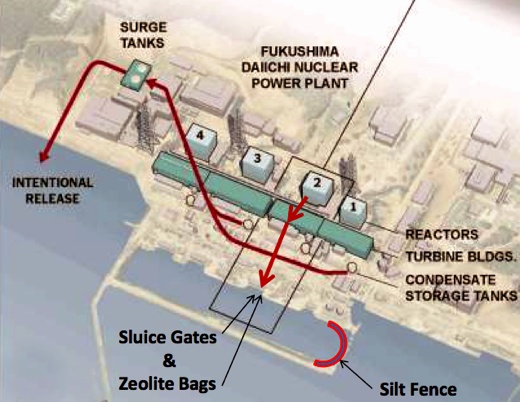SUBHEAD: International Atomic Energy Agency, lap dog of nuclear industry, to okay Fukushima release of radioactive water into Pacific Ocean.
By Staff on 4 December 2013 for ENENews -
(http://enenews.com/iaea-official-what-we-are-trying-to-say-is-consider-putting-toxic-fukushima-water-in-pacific-impact-on-human-health-must-be-monitored)

Image above: Detail of 2011 presentation slide by Lake Barrett, currently a Tepco adviser, of plan for intentional release of radioactive water into Pacific Ocean. From (http://nuclearfoundation.org/events_files/Barrett_Presentation_2_Part_2.pdf).
Juan Carlos Lentijo, head of IAEA’s mission to Fukushima Daiichi, Dec. 4, 2013: “Controlled discharge is a regular practice in all the nuclear facilities in the world. And what we are trying to say here is to consider this as one of the options to contribute to a good balance of risks and to stabilize the facility for the long term.”
Shunichi Tanaka, chairman of Japan’s Nuclear Regulation Authority, Dec. 4, 2013: “You cannot keep storing the water forever. We have to make choice comparing all risks involved.”
Xinhua, Dec. 4, 2013: Lentijo said that TEPCO should weigh the possible damaging effects of discharging toxic water against the total risks involved in the overall decommissioning work process. [...]
Tanaka highlighted the fact that while highly radioactive water could be decontaminated in around seven years, the amount of water containing tritium will keep rising, topping 700,000 tons in two years. [...] nuclear experts have repeatedly pointed out that [tritium] is still a significant radiation hazard when inhaled, ingested via food or water, or absorbed through the skin. [...] fisherman, industries and fisheries bodies in the Fukushima area and beyond in Japan’s northeast, have collectively baulked at the idea of releasing toxic water into the sea [...]
TEPCO will be duty-bound to submit assessments of the safety and environmental impact [...]
NHK, Dec. 4, 2013: IAEA team leader Juan Carlos Lentijo [...] said it is necessary and indispensable to assess the impact the tritium discharge might have on human health and the environment, and to get government approval as well as consent from concerned people.
Japan Times, Dec. 4, 2013: “Of course . . . public acceptance for this purpose is necessary,” said Lentijo, adding strict monitoring of the impact of the discharge would also be essential.
AFP, Dec. 4, 2013: [L]ocal fishermen, neighbouring countries and environmental groups all oppose the idea.
.
By Staff on 4 December 2013 for ENENews -
(http://enenews.com/iaea-official-what-we-are-trying-to-say-is-consider-putting-toxic-fukushima-water-in-pacific-impact-on-human-health-must-be-monitored)

Image above: Detail of 2011 presentation slide by Lake Barrett, currently a Tepco adviser, of plan for intentional release of radioactive water into Pacific Ocean. From (http://nuclearfoundation.org/events_files/Barrett_Presentation_2_Part_2.pdf).
Juan Carlos Lentijo, head of IAEA’s mission to Fukushima Daiichi, Dec. 4, 2013: “Controlled discharge is a regular practice in all the nuclear facilities in the world. And what we are trying to say here is to consider this as one of the options to contribute to a good balance of risks and to stabilize the facility for the long term.”
Shunichi Tanaka, chairman of Japan’s Nuclear Regulation Authority, Dec. 4, 2013: “You cannot keep storing the water forever. We have to make choice comparing all risks involved.”
Xinhua, Dec. 4, 2013: Lentijo said that TEPCO should weigh the possible damaging effects of discharging toxic water against the total risks involved in the overall decommissioning work process. [...]
Tanaka highlighted the fact that while highly radioactive water could be decontaminated in around seven years, the amount of water containing tritium will keep rising, topping 700,000 tons in two years. [...] nuclear experts have repeatedly pointed out that [tritium] is still a significant radiation hazard when inhaled, ingested via food or water, or absorbed through the skin. [...] fisherman, industries and fisheries bodies in the Fukushima area and beyond in Japan’s northeast, have collectively baulked at the idea of releasing toxic water into the sea [...]
TEPCO will be duty-bound to submit assessments of the safety and environmental impact [...]
NHK, Dec. 4, 2013: IAEA team leader Juan Carlos Lentijo [...] said it is necessary and indispensable to assess the impact the tritium discharge might have on human health and the environment, and to get government approval as well as consent from concerned people.
Japan Times, Dec. 4, 2013: “Of course . . . public acceptance for this purpose is necessary,” said Lentijo, adding strict monitoring of the impact of the discharge would also be essential.
AFP, Dec. 4, 2013: [L]ocal fishermen, neighbouring countries and environmental groups all oppose the idea.
.
No comments :
Post a Comment